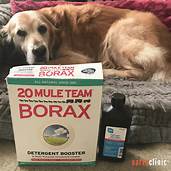Is Borax Toxic to Pets?
Borax is a naturally occurring mineral that is often used as a household cleaner. It is also used in some pet products, such as flea and tick shampoos. While borax is generally considered to be safe for use around pets, there are some potential risks that pet owners should be aware of.

What is Borax?
Borax is a white, powdery mineral that is composed of sodium borate. It is found in many parts of the world, and it is often used in the production of glass, ceramics, and detergents. Borax can also be used as a natural insecticide and herbicide.
How Can Borax Be Toxic to Pets?
Borax can be toxic to pets if it is ingested or if it comes into contact with their skin or eyes. Ingestion of borax can cause gastrointestinal problems, such as vomiting and diarrhea. It can also cause neurological problems, such as seizures and tremors. Contact with borax can cause skin irritation, redness, and swelling. It can also cause eye irritation, such as redness, swelling, and pain.
What Are the Symptoms of Borax Poisoning in Pets?
The symptoms of borax poisoning in pets can vary depending on the amount of borax that was ingested or the length of time that the pet was exposed to it. Common symptoms of borax poisoning in pets include:
- Vomiting
- Diarrhea
- Nausea
- Lethargy
- Tremors
- Seizures
- Skin irritation
- Redness
- Swelling
- Eye irritation
- Pain
What Should I Do If My Pet Has Been Exposed to Borax?
If you think that your pet has been exposed to borax, it is important to contact your veterinarian immediately. The veterinarian will be able to assess the severity of the exposure and recommend the best course of treatment. In some cases, treatment may involve hospitalization and supportive care. In other cases, the veterinarian may recommend giving your pet activated charcoal to help absorb the borax from the digestive tract.
How Can I Prevent My Pet from Being Exposed to Borax?
The best way to prevent your pet from being exposed to borax is to keep it out of reach. Borax should be stored in a safe place, such as a locked cabinet or on a high shelf. You should also avoid using borax-based products around your pet. If you must use a borax-based product, be sure to read the label carefully and follow the directions. Keep your pet away from the area where the product is being used and rinse the area thoroughly after you are finished.
Declaration: All article resources on this website, unless otherwise specified or labeled, are collected from online resources. If the content on this website infringes on the legitimate rights and interests of the original author, you can contact this website to delete it.





